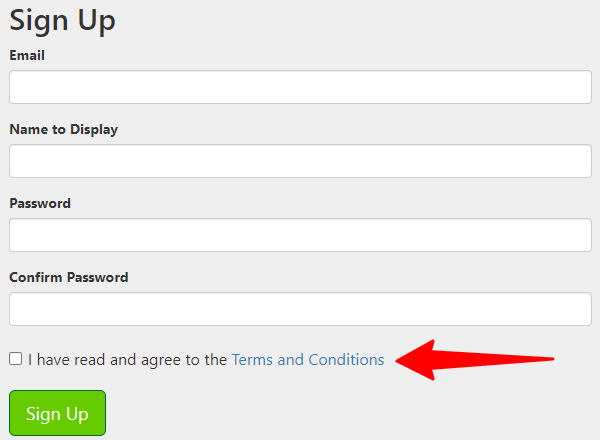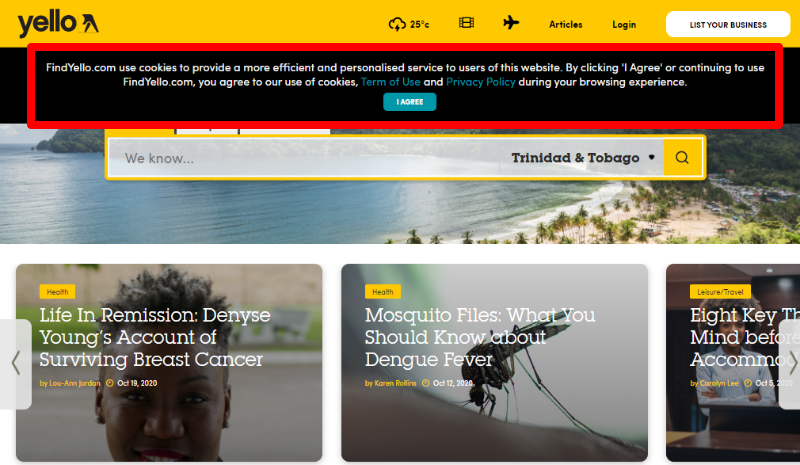On the footer of almost every website you visit — including directory websites — you will see a link to a Terms and Conditions page for that website. They may also be called Terms of Use, Terms of Service or Disclaimers.

Terms & Conditions pages are recommended on directory websites to set the rules by which users and listing owners must abide by in their use of the website, and so protect website owners, but are not usually required by law.
If done correctly, Terms & Conditions are a legally binding contract between you the directory website owner and the user, protecting you from any legal issues that may arise from someone else misusing the website.
If you presently own or operate a directory website, it may be a good time to review your own terms and conditions after reading this blog post, to see if it covers you adequately or if there’s anything you need to amend.
THIS IS NOT LEGAL ADVICE. PLEASE SEE A LAWYER IN YOUR JURISDICTION FOR ANY SPECIFIC LEGAL ADVICE REGARDING THIS AND ANY OTHER POTENTIAL LEGAL ISSUE.
Why does your directory website need terms and conditions?
There are a number of reasons why a website would need Terms and Conditions, but here are the ones we found most salient in our research.
It Sets the Governing Law
Since Terms and Conditions are a legally binding agreement, it’s important to set out under which country or region’s law — the jurisdiction — the agreement falls under.
For example, if you operate a city-based business directory in Texas, then your governing law clause could state:
These terms and conditions are governed by the laws of the United States of America and the laws of the State of Texas.
But if you operate a global or regional directory in a specific niche, then you could use the laws of a different country that you reside in altogether. You’re not actually bound to use the laws of the country that you reside in, but it would be smart to use laws that you have some familiarity with.
Not only the governing law, but some website owners expressly state in their Terms and Conditions how any disputes will be dealt with. For example, it could state that disputes would be settled by Arbitration only, and that use of the website would constitute agreement to that stipulation.

It States What Is and Isn’t Allowed and How Potential Abuse is Handled
Your Terms and Conditions would state what constitutes abuse of your directory website, and moreso, how any abuse would be handled. For example, spamming other users, providing false information or unauthorized methods of advertising are all types of abusive conduct on your directory website that you can shut down or otherwise take action against.
Once abuse is established, you can then proceed to respond to the abuse by taking steps such as amending any content yourself, a temporary block of a user, or even termination of a user’s account.
It Allows You to Limit Your Liability
If you allow User Generated Content (UGC) on your directory website then you would definitely need your Terms and Conditions to limit your liability for damages, for example in the event of plagiarism by a user or copyright infringement of a photo.
In the United States, you would use your Terms & Conditions to state your policy with regard to DMCA Notices. Specifically, where any DMCA notices should be sent.
If your directory website is also an ecommerce platform or marketplace, that’s another situation that you will need to expressly address.
It Sets Expectations on Directory Listings
Your terms and conditions should define to listing owners or advertisers what they’re getting from advertising in your directory.
If you have free listings as well as paid, your terms may set out their basic differences so that the business owners are clear on what they are paying for with different levels of listings. With free listings, you may be clear that there is no expectation of additional exposure or promotion.

What should be included in your directory website terms and conditions?
Here are the standard sections that should be included in your directory website’s terms and conditions:
- The Introduction
- Your governing law
- Your website’s or business’ intellectual property protection
- Rules of using the website (for users and listing owners/advertisers)
- Rules regarding User Generated Content and your use of them
- Your warranty disclaimer and limitation of liability
- Free vs. Paid listings
- Payment terms, and guarantees for paid listings and services
- Your copyright infringement information regarding DMCA Notices
- Contact information
- Last amended or effective date
Why you should not copy another website’s terms and conditions
Simply copying another website’s content — including a terms and conditions page — is a violation of that website’s copyright. You should never just copy and paste theirs’ verbatim, replacing your business name and/or website’s name with them.
If you are caught up in copyright infringement, you could be simply asked to remove the content or you could be asked to pay damages…or both! You could even find that the other party could ask your web host to block or remove your website, after they have provided the web host with evidence that you have copied their website content.
Another major reason you should not copy another website’s or directory’s Terms & Conditions is that their policy could be specifically tailored to their business, not yours. Copying their policy wholesale could expose your business to new legal issues.
How to get sample terms and conditions for your directory website?
It’s still helpful to look at similar directory websites’ terms and conditions to get an idea of what to include on your own, even if you shouldn’t copy it wholesale.
For example, if you run a local wedding vendor directory, you could have a look at Wedding Wire’s Terms of Use, especially the sections that speak about the vendor directory. You will see how they make distinctions between free vendors and paid subscriptions. You will also see at the very top how they mandate disputes be resolved.
If your directory is a fully paid one, you can have a look at the Terms and Conditions for Business Listings on Business.com.
Again, do not copy any website’s content verbatim, even if it’s legal policies like terms and conditions or privacy policies.
While you can attempt to write your own terms and conditions based on observing similar directory websites, you can also seek out terms and conditions templates online.
Terms and Conditions Generators
There are terms and conditions generators that are specific to directory websites (free and paid business directories). Here are three of them from which you can purchase documents (no affiliate links):
- Docular – https://docular.net/documents/template/13/directory-website-terms-and-conditions-free-and-paid
- Simply-docs – https://simply-docs.co.uk/Website-Terms-and-Conditions/Website-Terms-Conditions-Free-Business-Directory
- Website Contracts – https://www.website-contracts.co.uk/directory-website-terms-and-conditions.html
You could also try to generate a Terms and Conditions for your directory website using TermsFeed, one of the best policy generators on the web, even though it won’t be specific to a business directory. It can generate a very comprehensive policy that deals with account creation, payments, user content, data protection and everything else you would require for a directory website.
In all cases, you will have to review them carefully and amend them to your specific directory website and business model.
How to Implement Terms and Conditions on Your Directory Website
The “click-wrap” method is accepted as the best way to implement Terms and Conditions and enforce it for users on your business directory website.
Simply, the click-wrap method forces a user to do something to accept the website’s Terms and Conditions before moving forward, such as checking a box to agree with a website’s terms on a user registration form. Here’s an example:

To be clear on what we’re saying here:
Just including a link to your Terms & Conditions on the footer of your directory website is not the best way to enforce them.
Besides having a check-box on your user registration form, you could also implement a clearly visible floating modal on the screen on your non-logged-in content pages, which a new visitor would see on first visit. This would include links to your Terms and other legal pages. This is an acceptable implementation of the “browsewrap” method.

If you need to, here’s a clear resource on the two methods: Browsewrap vs. Clickwrap. https://termly.io/resources/articles/browsewrap-vs-clickwrap/
Conclusion
Legal policies like Terms and Conditions are very important for directory website operators, even if they are not legally required like privacy policies. When properly implemented, they serve to protect all parties — directory owners, users and listings owners — from negative situations arising from the use of any website.
Whether you get your policy from a free sample terms and conditions for directory websites or you purchase one from a policy generator, it’s in your best interest to have a lawyer review any legal policy on your website.
